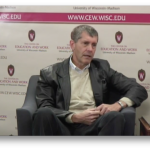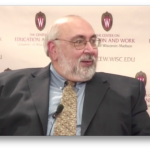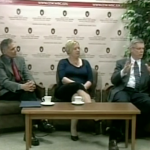Afternoon Tea Seminar Series
Afternoon Tea seminars were a series of conversations on career and workforce development in which V.Scott Solberg, Ph.D, who is currently a professor in counseling psychology at Boston University, conducted casual interviews with distinguished researchers and faculty in the field of vocational psychology. Afternoon Tea seminars were organized by the Center on Education and Work at University of Wisconsin-Madison.
Trian Tracy is a distinguished professor in counseling psychology at Arizona State University. He talked about a wide range of methods of career interest assessments.
Steven Brown, Ph.D. is a well-known faculty at Loyola University Chicago and a co-author of Social Cognitive Career Theory (SCCT). His talk focused on career decision-making difficulties as one of the major issues in career interventions and its solutions.
Mark Savickas, a professor at Northeastern Ohio Universities College of Medicine, is the author of Career Construction Theory and demonstrates a narrative method for helping clients in career counseling.
Ellen Henson is a senior employment service specialist in International labor Organization in Switzerland. She talked about global challenges especially career development needs of low- and middle-income countries.
John Vardallas is a founder and CEO of the American Bloomer sharing his perspectives about “All Things Bloomer.”
Dennis Winter is an expert and economic analyst modeling and forecasting and a vice-president and research of North Star Economics.
The conversation focused on learning what makes competitive and employable in today’s changing economy.
Graduate students who returned to college as an adult shared their experiences and resources they used to help them become successful and navigate challenges of going back to school.
Promoting Quality Individualized Learning Plans – A “How to Guide” Focused on the High School Years
This Guide has been prepared under the aegis of a cooperative agreement between the U.S. Department of Labor’s Office of Disability Employment Policy (ODEP) and the National Collaborative on Workforce and Disability for Youth (NCWD/Youth) housed at the Institute for Educational Leadership (IEL). Three authors have contributed to the development of this Guide. Ms. Joan Wills, a Senior Fellow at IEL has oversight responsibilities for the work, Dr. V. Scott Solberg from Boston University’s School of Education has the lead responsibility for conducting a series of research studies centered on the effects of schools instituting individualized learning plans (ILPs), and Mr. David Osman is a consultant with deep experience in preparing career development materials for the federal government. Learn more here
Use of Individualized Learning Plans: A Promising Practice for Driving College and Career Efforts
This report summarizes the findings and recommendations of ILP research and technical assistance activities that were completed between 2007 and 2013. The purpose of these activities was to investigate whether ILPs should be considered a promising practice for youth with and without disabilities and to identify promising state, district, and school ILP implementation strategies. To learn about the two overarching patterns we discovered, click here.
Info Brief: Understanding the New Vision for Career Development: The Role of family
This Info Brief introduces families, including families of youth with disabilities, to a new way of looking at career development for youth. This brief discusses the three phases of career development, highlights Individualized Learning Plans as a tool for facilitating the career development process, and offers strategies on how families can be involved. To access the full brief, click here.
Info Brief: Families and College and Career Readiness: What Schools Can Do to Engage Families in the Individualized Learning Pan (ILP) Process
This Information Brief is designed to assist educators in working with parents and family members to facilitate students’ career development through the use of individualized college and career planning
tools. This brief discusses families’ perceptions of whether and how they were engaged in schools’ implementation of Individualized Learning Plans and describes suggestions from families of youth with and without disabilities about actions schools can take to improve family engagement in the ILP process. To access the full brief, click here.
Policy Brief: Using Individualized Learning Plans to Produce College and Career Ready High School Graduates
To generate the competitive workforce needed to improve and maintain strong economies, state
elected and appointed officials have embraced college and career readiness as a major outcome of secondary education. Recently, states have begun partnering with post-secondary institutions to develop common definitions of what college ready means and are working across state lines to strengthen the content of curricula for core courses. To see the full policy brief, click here.
Fact Sheet: Individualized Learning Plans
This fact sheet analyzes individualized learning plans (ILPs), their effectiveness, and much more. Learn more here.
Families Ability to Support Their Youth With Disabilities in Preparing for Post-School Transitions: Strategies and Challenges
The purpose of this study was to learn about the ways in which parents conceptualize career development for their children with disabilities. Ultimately, the results of the study will assist parents to serve as strong advocates for their child and understand the ways in which they can be actively involved in transition planning. To learn more, click here.
Using Adaptability as an Indicator of Transition Readiness Among Adolescent Youth
Looking to discuss the context and nature of our work on transition? Or to describe how adaptability serves as an important developmental mechanism? In this presentation, we introduce the study on adaptability and describe the results through a critical lens. For more information, see here.
Career Narratives to Understand Adolescent Career Identity Development: Exploratory Mixed-Methods Comparative Study Using Three Theories
To explore the development of Career Identity in Adolescents utilizing a variety of studies and theories, click here.
Developing Self-Determination and Career Readiness Skills Through Individualized Learning Plans
Should ILPs be considered a promising practice for developing college and career readiness? Are students with disabilities participating in ILPs? Should ILPs be considered a promising practice for college and career readiness among students with disabilities? For answers and more, click here.







